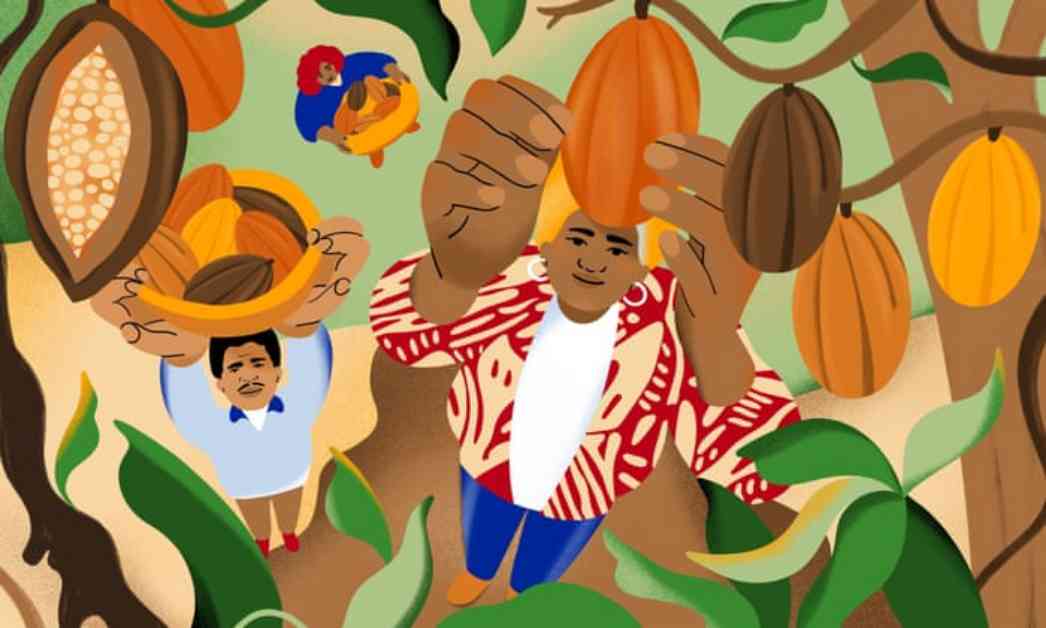In Côte d’Ivoire and Ghana, cocoa farmers are facing the harsh realities of climate change. With rising temperatures, irregular rainfall, and prolonged droughts, their crop yields are decreasing, leading to lower incomes. Despite these challenges, cocoa remains a vital crop for smallholder farms in western Africa, with around 70% of the world’s chocolate originating from small, privately owned cocoa farms in countries like Côte d’Ivoire, Ghana, Cameroon, and Nigeria. As local farmers bear the brunt of environmental degradation, insufficient investment, and the climate crisis, the importance of implementing good agricultural practices has never been more critical.
Sustainable farming practices are key to the future of cocoa production in these regions. One essential practice highlighted by Darrell High, head of Nestlé’s Cocoa Plan, is pruning. High emphasizes the significance of pruning cocoa trees to improve productivity. By eliminating tangled branches and promoting better aeration, pruning reduces the risk of fungal and insect-borne diseases, ultimately leading to increased cocoa yields. Through initiatives like the Cocoa Plan, farmers are trained and equipped to implement effective pruning techniques, resulting in improved crop outcomes.
Incentivizing farmers to adopt sustainable practices is crucial for driving positive change in cocoa farming communities. Nestlé’s Income Accelerator program offers financial support to farmers who embrace practices such as diversifying income sources, enrolling their children in school, implementing good agricultural practices, and undertaking regeneration initiatives. By rewarding farmers for meeting specific targets in these areas, the program encourages the adoption of sustainable practices like pruning, ultimately leading to increased profits and improved livelihoods for participating families.
Tree planting is another essential aspect of sustainable cocoa farming. Nestlé encourages farmers to plant fruit trees on their cocoa farms, providing both environmental benefits and additional income opportunities. Fruit trees help replenish soil nutrients, enhance ecosystem resilience, and provide shade to cocoa plants, mitigating the impacts of climate change. Through initiatives like the Income Accelerator program, farmers receive support for planting and maintaining trees, contributing to the overall sustainability of cocoa production.
The importance of shade management in cocoa plantations cannot be understated, particularly in the face of changing weather patterns and increased droughts. Shade trees not only help regulate surface temperatures but also contribute to moisture release, humidity buildup, and potential rainfall, creating more favorable conditions for cocoa cultivation. By incorporating shade management practices and tree planting initiatives, farmers can enhance their resilience to climate change and improve cocoa productivity in the long run.
Efforts to protect primary forests in western Africa are integral to building a sustainable cocoa supply chain. The Nestlé Cocoa Plan aims to achieve a deforestation-free cocoa supply chain by 2025, working in collaboration with local stakeholders and organizations to monitor and safeguard forested areas. Through partnerships with forest development agencies and conservation groups, Nestlé employs satellite imagery and on-the-ground patrollers to identify and address deforestation threats, preserving valuable ecosystems and biodiversity.
In regions like Côte d’Ivoire and Ghana, the preservation of sacred forests holds cultural, historical, and ecological significance for local communities. By engaging with community members and promoting the value of trees through education and awareness campaigns, Nestlé empowers farmers to practice regenerative agriculture and protect native forests. Through initiatives like the planting of agroforestry trees and the restoration of degraded lands, Nestlé is actively contributing to the conservation and restoration of forested areas in cocoa-growing regions.
The success of sustainability initiatives in cocoa farming communities is evident in the positive outcomes observed over time. Increased cocoa production, improved livelihoods, and enhanced environmental conservation are just some of the benefits resulting from the adoption of sustainable practices. By supporting farmers in implementing good agricultural practices, promoting tree planting, and safeguarding forested areas, Nestlé is paving the way for a more sustainable and resilient cocoa industry in western Africa.
In conclusion, the efforts to improve cocoa communities through sustainable agricultural practices are essential for addressing the challenges posed by climate change and environmental degradation. By incentivizing farmers to adopt sustainable practices, promoting tree planting initiatives, and protecting primary forests, companies like Nestlé are making significant strides towards building a more sustainable cocoa supply chain. Through collaborative partnerships and community engagement, the future of cocoa farming in western Africa looks promising, with increased resilience, productivity, and prosperity for farmers and their families.

